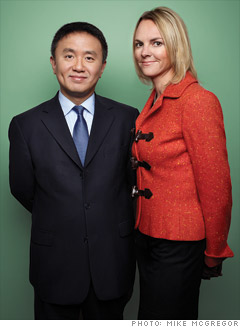Top stock picks from top pros
They racked up some of the best fund returns of the Lost Decade by sticking with this simple strategy: Buy quality. Here's where they see opportunity now.

Their picks: LVMH and Novartis
"LVMH owns Louis Vuitton and other coveted luxury brands," Wang says. "Higher-end consumers may rein in spending a little when things are bad, but when markets are up, they open their purses. LVMH recently raised prices in Europe without hurting sales; such pricing power is important if you believe inflation will be a problem."
"A lot of Novartis's patent risks are priced into the stock," Trevisani says. "Its pipeline is coming to fruition successfully, unlike a lot of its peers. And the company is very diversified, so even if you believe it will suffer on the pharma front, it has a thriving business in generics, over-the-counter drugs, and vaccines."
Their strategy: Trevisani and Wang, along with co-manager Bill Fries, prepare for different market conditions by dividing their investments -- all overseas companies -- into three baskets.
They put roughly 40% into "basic value" companies, essentially firms that are sensitive to the global economy. Another 40% is in blue-chip businesses with consistent earnings that bolster the fund in down markets. The remaining 20% is in fast-growing franchises, which have potential for high returns.
"A key to the success we've had is our diversification," says Trevisani, 40. "We try not to be reactive, and we'll look in any country, in any sector."
Where they see opportunity: "We own a lot of global pharma companies, which fall into our blue-chip basket," says Trevisani. "The U.S. is a major profit center for such companies. And while we don't have a crystal ball on health care reform, some firms are being penalized just because they're health care companies.
"We're also starting to find opportunities in our basic value category," she adds. "Economic volatility has given us a chance to pick things off at low prices. Consumer discretionary stocks, like retailers, are one example.
"In my opinion, the consumer's spending power is underestimated, and the growth that can stem from emerging markets is still in the early stages."
Trevisani and Wang do have some trepidation regarding emerging markets, however: "it looks like these countries will raise interest rates to keep inflation in check," says Wang, 39. "So we are looking more to multinational firms that have exposure to emerging markets but are not subject to the policies in those countries."
NEXT: Rick Aster

